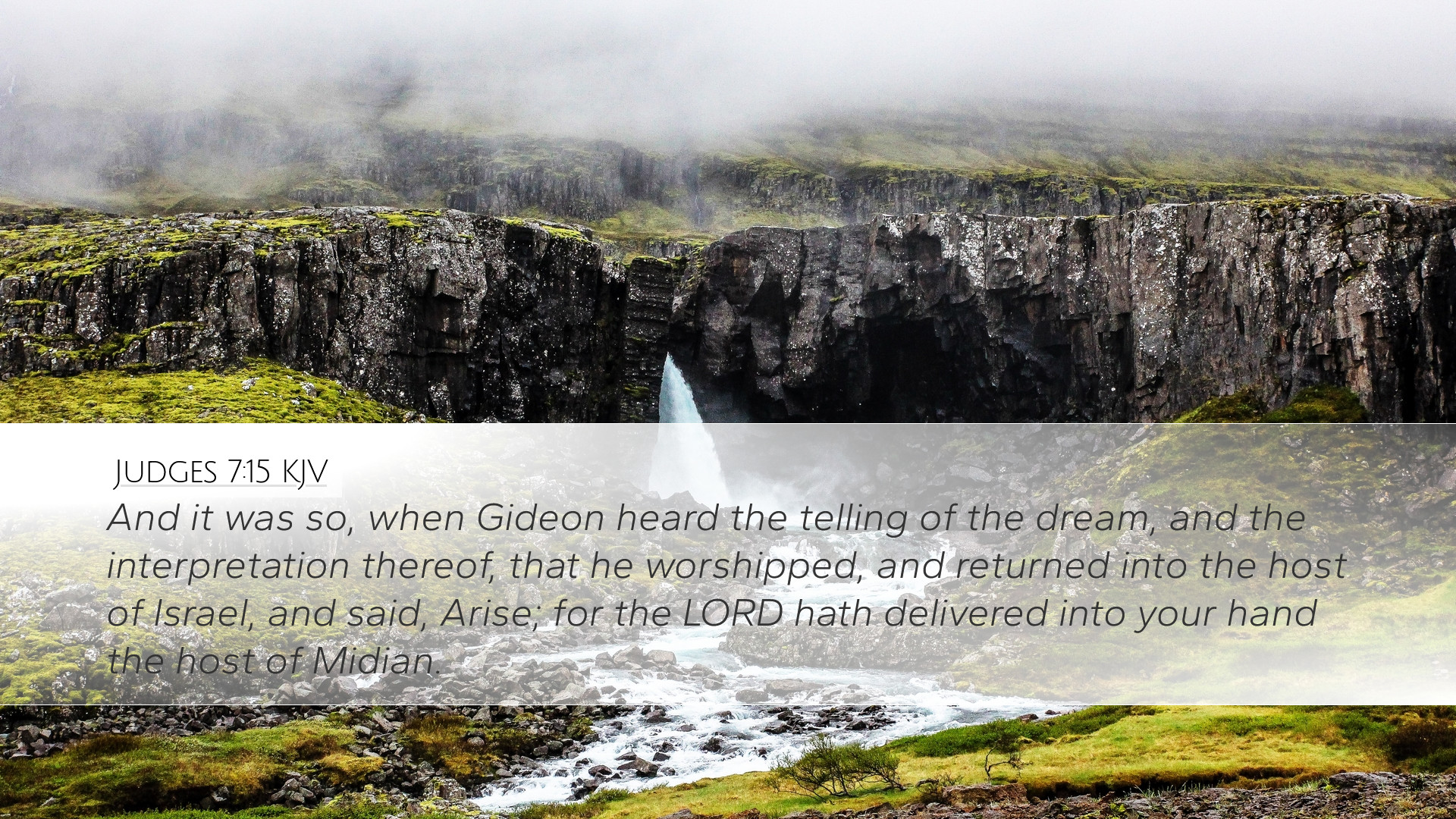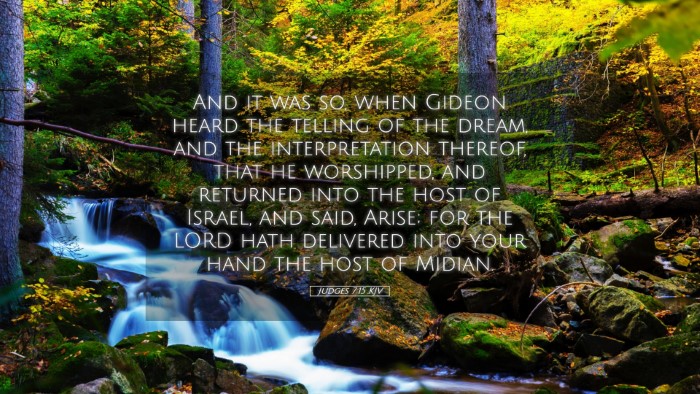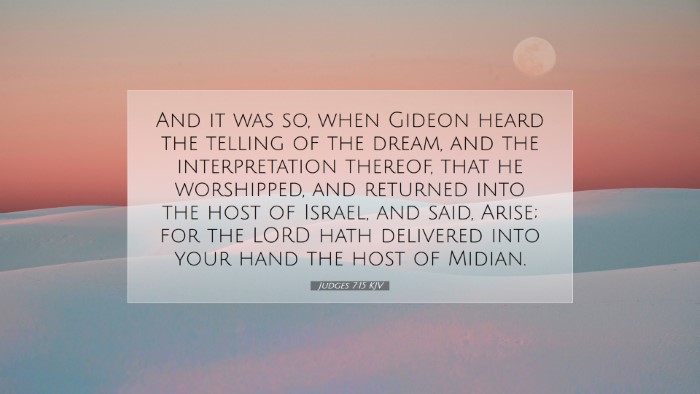Old Testament
Genesis Exodus Leviticus Numbers Deuteronomy Joshua Judges Ruth 1 Samuel 2 Samuel 1 Kings 2 Kings 1 Chronicles 2 Chronicles Ezra Nehemiah Esther Job Psalms Proverbs Ecclesiastes Song of Solomon Isaiah Jeremiah Lamentations Ezekiel Daniel Hosea Joel Amos Obadiah Jonah Micah Nahum Habakkuk Zephaniah Haggai Zechariah MalachiJudges 7:15
Judges 7:15 KJV
And it was so, when Gideon heard the telling of the dream, and the interpretation thereof, that he worshipped, and returned into the host of Israel, and said, Arise; for the LORD hath delivered into your hand the host of Midian.
Judges 7:15 Bible Commentary
Commentary on Judges 7:15
Contextual Background: Judges 7:15 is a pivotal moment in the narrative of Gideon, a significant figure in Israel's history. This verse marks the transition from divine assurance to action. Gideon, having received reassurance from God, rallies his troops for battle against the Midianites.
Text of Judges 7:15
“And it was so, when Gideon heard the telling of the dream, and the interpretation thereof, that he worshipped, and returned into the host of Israel, and said, Arise; for the Lord hath delivered into your hand the host of Midian.”
Commentary Insights
Meditation on Gideon's Response
Matthew Henry emphasizes Gideon's immediate response of worship upon hearing the interpretation of the dream. This act reflects a deep reverence and acknowledgment of God's sovereignty. Henry notes, “Worship is the right return of our souls to God for the assurance of His promises.” Gideon's act of worship signals a turning point where faith begins to fuel action.
Understanding the Dream and Its Interpretation
Albert Barnes elaborates on the significance of the dream about the barley cake rolling into the Midianite camp, symbolizing God's forthcoming victory. The interpretation reveals that the Midianites recognize God's power behind Gideon, stating, “This is nothing less than the sword of Gideon.” Barnes highlights how God uses an unlikely source—an enemy's dream—to instill confidence in His chosen leader.
Worship as a Response to Revelation
Adam Clarke underlines the importance of worship in responding to divine revelation. He interprets Gideon’s action as an example for all believers. When faced with God’s promises, Clarke suggests that worship should precede our actions: “Before we undertake any great work, we should lay our foundations in worship and acknowledgment of God.” This week's testimony aligns with 1 Thessalonians 5:16-18, emphasizing continuous worship and prayer.
The Transition from Fear to Courage
The verse indicates a moment of transformation for Gideon and his men. Matthew Henry notes that the fear present prior to the encounter is replaced with boldness. “The report of the enemy brings forth faith in Gideon,” he remarks. As believers grasp the truths of God’s intervention and presence, they transition from timidity to confidence.
Collective Action and Leadership
In calling the men to arise, Gideon exhibits critical leadership qualities. Barnes stresses that effective leaders cultivate a spirit of encouragement among their followers, sharing the news of God’s deliverance. The call to "arise" acts as a rallying cry, reminding the people of God's promise, which is essential for mobilizing the community in faith.
Implications for Today’s Believers
The commentary suggests practical applications for modern believers. Clarke emphasizes the need for church leaders and believers alike to constantly seek God’s confirmation and direction through prayer and worship. The act of gathering as a community to affirm God’s promises is vital for spiritual growth and mutual encouragement in faith.
The Nature of God’s Deliverance
Henry remarks, “The Lord hath delivered into your hand.” This statement reassures the believers of God's faithfulness and the surety of His promises. This verse reassures that God will act on behalf of His people and that deliverance may often come from surprising means or sources, showcasing His sovereignty throughout history and personal lives.
Concluding Thoughts
Judges 7:15 encapsulates the essence of spiritual assurance leading to faithful action. The transformation demonstrated by Gideon and his men serves as an inspiring model for both individual believers and communal worship. As they rise to face their challenges, the underlying principle articulated by Clarke remains pertinent: worship precedes action. In the same way that Gideon’s faith was ignited by divine revelation, so too must today's believers respond to God’s invitations with worship, ready to take up the mantle of service in their own contexts.


